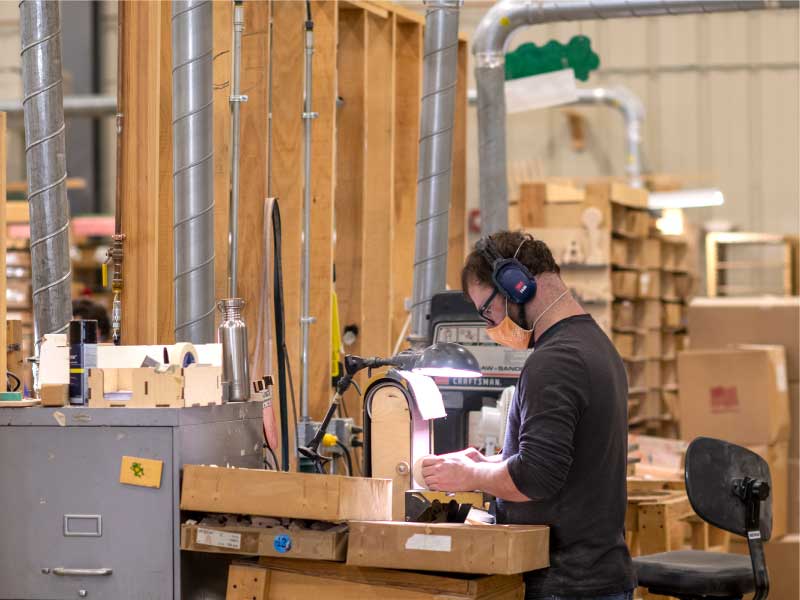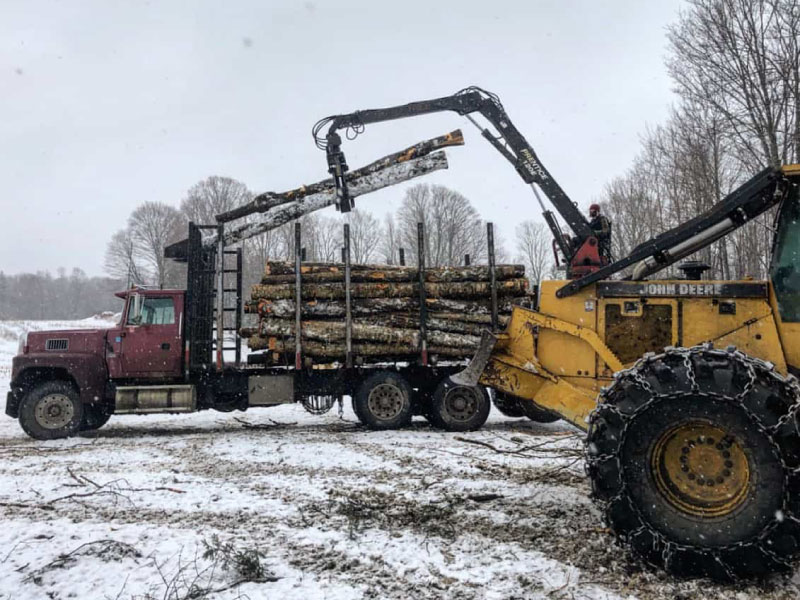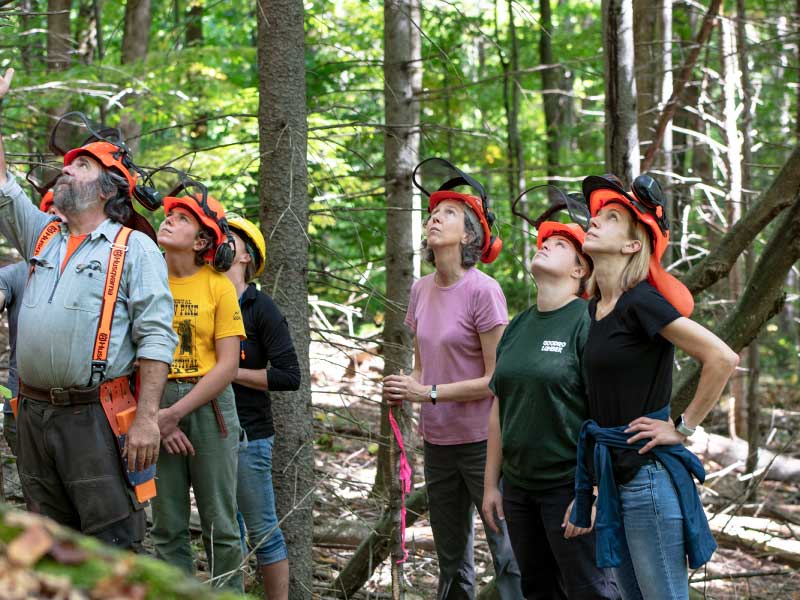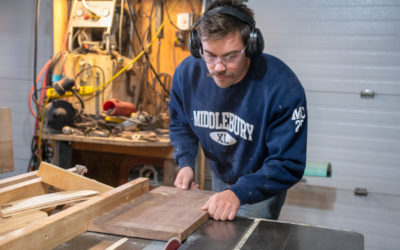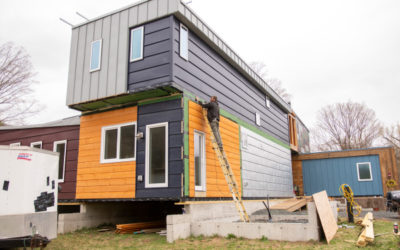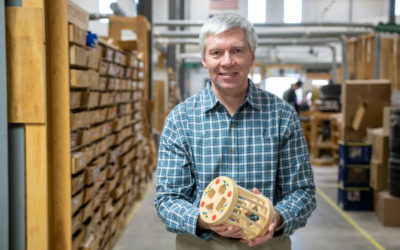Forest Products
From Family Business to Big Business10,000
jobs in Vermont’s forest products industry
78%
of Vermont is forested
$1.9 billion
annual economic output
$79 million
total annual wages, wood manufacturing industry
Stewardship and smart, strategic business practices keep Vermont’s most valuable natural resource sustainable.
From thermal energy to construction and manufacturing, Vermont’s economy depends upon the forest products industry.
Vermont has a long history of forestry and forestry management, first opening a sawmill in Westminster in 1739. Today, our forest products industry has become a key economic driver supporting over 10,500 jobs. (Forest recreation adds another $1.9 billion in economic output, and another 10,000 jobs.)
Known as the Green Mountain State, Vermont did not always live up to this nickname. In the late 1800s, clearcutting was rampant and only 20% of the state’s forests remained. However, through conservation efforts, the forests have returned and today 78% of Vermont’s land (4.6 million acres) is forested.
Vermont’s diverse forests lie within a biological transition zone, so they contain both northern boreal forests and southern deciduous trees. This diversity makes Vermont forests a valuable, sustainable, and renewable resource. Today, Vermonters use the forests for lumber and to create furniture, turnings, moldings, and other wood products.
The forest products industry within Vermont features many players. Wood product production starts with foresters and loggers but then can diverge to manufacturers or to craftspeople and artisans, all producing valuable, value-added products from furniture to wood pellets and chips to maple syrup.
The state supports the industry through forestry education and sustainable land-use management. Vermont’s higher education institutions have all incorporated an element of forestry into their curricula. The University of Vermont offers degrees in forestry through its renowned Rubenstein School. Vermont Technical College and Green Mountain Tech and Career Center emphasize forest management, with hands-on programs throughout the state.
Nonprofit organizations have also played an integral role in enhancing the economic vitality of forestry enterprises. Organizations such as Vermont Woodlands Association, Vermont Forest Products Association, and Vermont Wood Works Council are just some of the trade organizations that provide support to the industry; in addition, nonprofits such as Vermont Sustainable Jobs Fund, Vermont Housing and Conservation Board, and the Northern Forest Center offer business assistance and strategic planning help to businesses throughout the sector. The Working Lands Enterprise Initiative offers grants and other support to the industry as well. In 2018, these and other partners launched the Vermont Forest Industry Network to better connect businesses throughout the supply chain from tree to table and help expand markets for Vermont wood products.
Interested in the forestry industry but don’t know where to start?
Vermont Businesses Are Hiring:
Available Funding & Assistance for VT Forest Products Industry
blank
Tax Exemption and Credit
The Vermont Department of Taxes offers both a tax exemption and credit for forest products businesses:
- Exemption for Forestry and Wood Products Machinery, Equipment, and Repair Parts
- Wood products manufacture tax credit (§ 5930y) offers a credit of two percent of the wages paid in the taxable year by an employer for services performed in the designated counties associated with the manufacture of finished wood products.
- The Northern Forest Center has compiled resources from experts around the country to help wood products manufacturers transform their businesses, become more competitive and continue providing quality jobs.
The Flexible Capital Fund (Flex Fund)
The Flexible Capital Fund (Flex Fund) offers Vermont growth-stage companies in sustainable agriculture and food systems, forest products, and clean technology sectors loans that have “equity like” features but are often in smaller amounts and at lower returns than traditional venture capital financing.
Vermont Farm & Forest Viability Program
The mission of the Vermont Housing & Conservation Board (VHCB)’s Vermont Farm & Forest Viability Program is to enhance the economic viability of Vermont farms and forestry enterprises. This program offers business advising, as well as grants on a competitive basis.
Vermont Forest Industry Network
The Vermont Sustainable Jobs Fund (VSJF)’s Vermont Forest Products Program coordinates the Vermont Forest Industry Network, established in 2018 to connect businesses across Vermont’s forest and wood products supply chain to strengthen industry-wide relationships and explore new market development opportunities for Vermont’s forest and wood products.
- VSJF’s Business Management Coaching Service provides tailored business management coaching, entrepreneurial support, and training to position Vermont entrepreneurs for growth and long-term success.
- The Vermont Wood Works Council offers a host of resources to businesses with its paid membership program. The Council works to promote the long-term viability of woodworking by expanding members presence in the marketplace, ensuring a sustainable supply of raw materials, increasing workforce skill, and acting as responsible employers and community members.
Working Lands Enterprise Initiative (WLEI)
The Working Lands Enterprise Initiative (WLEI) offers Market Level Impact Business Grants of $50,000-$150,000 for forestry, wood products, and dairy sectors only.
WLEI is also partnering with the Vermont Agency of Agriculture, Food and Markets on the Vermont Forest Business School, offering training for mid-career forest business owners and professionals.
Further Reading
Middlebury Grads Return to VT to Start Woodworking Business
Photo by Erica Houskeeper | Treeline Terrains co-founder Nathaniel Klein starts a piece in a workshop in Middlebury. Each mountain is made with...
A Vermonter’s Approach to Sustainable, Affordable Housing
By Christine McGowan, Forest Products Program Director at Vermont Sustainable Jobs Fund | Photo by Erica Houskeeper, courtesy of the VSJF Ten...
Maple Landmark, America’s “Local Toy Company,” Rooted in Family, Forest
Mike Rainville, founder and owner of Maple Landmark, landed his first wholesale account at age 15, when a traveling salesman noticed the wooden tic...
We Want You to Succeed in Vermont.

